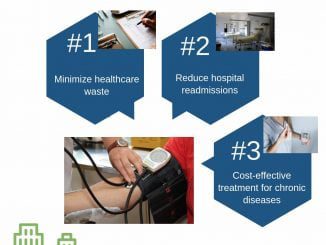
RALEIGH – Carolinas HealthCare System and UNC Health Care announced Thursday their plan to create one of the largest non-profit healthcare systems in the nation, by blending the state’s largest comprehensive healthcare system with the Triangle’s largest academically-based health enterprise.
Carolinas HealthCare System and UNC Health Care have signed a Letter of Intent (LOI) to join their clinical, medical education and research resources. Under the LOI, the two organizations have agreed to start a period of exclusive negotiations, with the goal of entering into final agreements by the end of the year.
“The new organization will deliver world-class care to people in North Carolina by creating the most comprehensive network of primary, specialty and on-demand care in the Southeast,” a joint press release stated.
“Together with UNC Health Care, we believe that the opportunities to be a national model and to elevate health in North Carolina are nearly limitless,” said Gene Woods, current president and CEO of Carolinas HealthCare System, and future CEO of the new entity.
“For example, since our organizations already serve almost 50 percent of all patients who visit rural hospitals in our state, we are perfectly positioned to participate in the reinvention of rural healthcare in partnership with others. Combined with UNC Health Care’s National Cancer Institute designation, with more than $70 million in joint cancer research grants for clinical trials, we will create a cancer network that is second to none in the country. In short, this partnership is an example of one of those truly ‘big ideas’ that this state is known for.”
The merger seeks to improve access to care in underserved and rural geographies, by focusing on behavioral health needs, designing new models of care and further developing virtual care platforms. The joint organization also will work to expand medical education, serving as the platform for training future healthcare providers. Priority will be placed on the development of clinical care destination centers and centers of excellence as well as differentiated care in pediatrics, cancer, transplant services, among others.
“By integrating our organizations, we are combining the strengths of two great health systems, providing greater access to a full range of services and leading-edge treatments for patients, enabling better coordination of care and advancing research,” said Dr. William Roper, dean of the UNC School of Medicine, CEO of UNC Health Care, and future executive chair of the new organization.
“Carolinas HealthCare System is one of the most innovative healthcare organizations in the nation, particularly in combining world-class clinical care with a community care model. By combining our two extremely mission-focused organizations, we will offer an unparalleled array of services, expertise and experiences for our patients and communities – beyond what either of us could do independently.”
According to the press release, the new company will:
- Provide both urban and rural populations with close-to-home options for world-class care.
- Offer nearly 1,400 active clinical trials that can quickly help uncover solutions and deliver treatments.
- Serve as the cornerstone for Medicaid coverage in North Carolina.
- Strengthen collaboration with other healthcare providers to improve patient experience and bring affordable care to the region.
- House seven nationally-ranked adult clinical service lines and nine nationally-ranked pediatric clinical service lines.
- Drive research opportunities that advance discovery and innovation to find new cures and change the way care is delivered.
- Educate the next generation of physician leaders at the nationally ranked UNC School of Medicine, through more than 100 residency programs in its enhanced network of teaching hospitals across the state, and through lifelong learning for providers.
- Train, support and retain the healthcare professionals needed to serve North Carolina and beyond
While this joint endeavor has been made public, the details have yet to be reviewed and sanctioned by the Federal Trade Commission. Negotiations will occur in the coming months as the FTC considers the potential effects the proposed plan could have on patients’ hospital and doctor choices, as well as any consequences for healthcare costs in the state.


